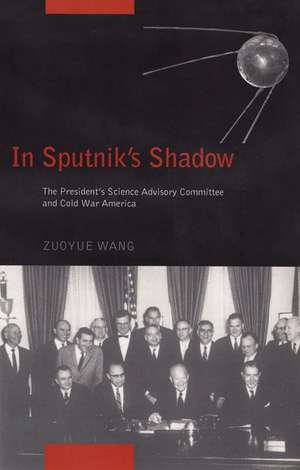In Sputnik's Shadow: The President's Science Advisory Committee and Cold War America
Autor Professor Zuoyue Wangen Limba Engleză Paperback – 28 iul 2009
In today’s world of rapid advancements in science and technology, we need to scrutinize more than ever the historical forces that shape our perceptions of what these new possibilities can and cannot do for social progress. In Sputnik’s Shadow provides a lens to do just that, by tracing the rise and fall of the President’s Science Advisory Committee from its ascendance under Eisenhower in the wake of the Soviet launching of Sputnik to its demise during the Nixon years. Members of this committee shared a strong sense of technological skepticism; they were just as inclined to advise the president about what technology couldn’t do—for national security, space exploration, arms control, and environmental protection—as about what it could do.
Zuoyue Wang examines key turning points during the twentieth century, including the beginning of the Cold War, the debates over nuclear weapons, the Sputnik crisis in 1957, the struggle over the Vietnam War, and the eventual end of the Cold War, showing how the involvement of scientists in executive policymaking evolved over time. Bringing new insights to the intellectual, social, and cultural histories of the era, this book not only depicts the drama of Cold War American science, it gives perspective to how we think about technological advancements today.
Zuoyue Wang examines key turning points during the twentieth century, including the beginning of the Cold War, the debates over nuclear weapons, the Sputnik crisis in 1957, the struggle over the Vietnam War, and the eventual end of the Cold War, showing how the involvement of scientists in executive policymaking evolved over time. Bringing new insights to the intellectual, social, and cultural histories of the era, this book not only depicts the drama of Cold War American science, it gives perspective to how we think about technological advancements today.
Preț: 225.28 lei
Preț vechi: 281.66 lei
-20% Nou
Puncte Express: 338
Preț estimativ în valută:
43.11€ • 44.75$ • 35.95£
43.11€ • 44.75$ • 35.95£
Carte indisponibilă temporar
Doresc să fiu notificat când acest titlu va fi disponibil:
Se trimite...
Preluare comenzi: 021 569.72.76
Specificații
ISBN-13: 9780813546889
ISBN-10: 0813546885
Pagini: 488
Ilustrații: 4 illustrations
Dimensiuni: 156 x 235 x 28 mm
Greutate: 0.83 kg
Ediția:None
Editura: Rutgers University Press
Colecția Rutgers University Press
ISBN-10: 0813546885
Pagini: 488
Ilustrații: 4 illustrations
Dimensiuni: 156 x 235 x 28 mm
Greutate: 0.83 kg
Ediția:None
Editura: Rutgers University Press
Colecția Rutgers University Press
Notă biografică
Zuoyue Wang is a professor of history at California State Polytechnic University, Pomona.
Cuprins
American public science, 1863-1945
The origins of technological skepticism, 1945-1950
Mobilizing science for the Korean War under Truman, 1950-1952
Science and the national security state under Eisenhower, 1952-1957
Eisenhower, Sputnik, and the creation of PSAC, 1957
PSAC and the launching of NASA, 1957-1960
Military technology, 1957-1960
The search for a nuclear test ban, 1957-1960
The politics of big science, 1957-1960
The control of science policy under Eisenhower, 1957-1960
Science at the new frontier under Kennedy, 1960-1963
Responding to Rachel Carson's Silent spring, 1962-1963
Testing the limits, 1961-1963
"Scientists for Johnson," 1964
PSAC, the Vietnam War, and the ABM debate, 1964-1968
The politics of technological dissent under Nixon, 1969-1973
The origins of technological skepticism, 1945-1950
Mobilizing science for the Korean War under Truman, 1950-1952
Science and the national security state under Eisenhower, 1952-1957
Eisenhower, Sputnik, and the creation of PSAC, 1957
PSAC and the launching of NASA, 1957-1960
Military technology, 1957-1960
The search for a nuclear test ban, 1957-1960
The politics of big science, 1957-1960
The control of science policy under Eisenhower, 1957-1960
Science at the new frontier under Kennedy, 1960-1963
Responding to Rachel Carson's Silent spring, 1962-1963
Testing the limits, 1961-1963
"Scientists for Johnson," 1964
PSAC, the Vietnam War, and the ABM debate, 1964-1968
The politics of technological dissent under Nixon, 1969-1973
Recenzii
In Sputnik's Shadow represents the most extensive and scholarly effort to document the role of the science advisory system in its difficult function of moderating scientific and technological excesses while at the same time promoting public interest.
Descriere
In Sputnik's Shadow traces the rise and fall of the President's Science Advisory Committee from its ascendance under Eisenhower to its demise during the Nixon years. Zuoyue Wang examines key turning points during the twentieth century, including the beginning of the Cold War, the debates over nuclear weapons, the Sputnik crisis in 1957, the struggle over the Vietnam War, and the eventual end of the Cold War, showing how the involvement of scientists in executive policymaking evolved over time and brings new insights to the intellectual, social, and cultural histories of the era.
